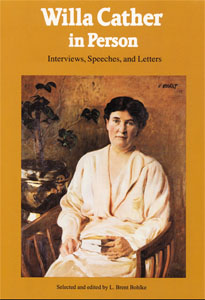from Willa Cather in Person: Interviews, Speeches, and Letters
Selected and edited by L. Brent Bohlke
Lincoln & London: University of Nebraska Press, 1986
Introduction
Willa Cather was a splendid letter writer. All the talent contained in her published works is evident in her personal correspondence as well. Yet she felt her letters to be quite different from the writing she did for publication. They were personal, not public, and often hurried and not revised. Following her feeling, her will absolutely restricts the publication of any of her correspondence. Cather's desire was that all of her correspondents destroy her letters after her death. Some did, but many others contributed the letters to various collections across the country. As a result, many of her letters are available to qualified scholars, but they may not be quoted directly. So they have often been paraphrased in an unavoidably slanted manner. Willa Cather always speaks in a clearer and more graceful style than anyone reporting on what she says.
An example of the strange results of the restriction placed on her letters is found in a curious footnote to an article in the March 1938 issue of American Literature entitled "The Genius of Willa Cather." The author, Robert H. Footman, writes: Since I wrote these words, I have come across a relevant statement by Willa Cather, the source of which I am not at liberty to publish. She says: "In some books I have done more careful planning than in others, but always the end was seen from the beginning, and in each case it was the end that I set out to reach— I mean, literally, the end of the story: not necessarily the scene, but the feeling of the end, the mood in which I should leave my characters and in which I myself should say good-by to them. But practically everything beside the central purpose or the central feeling comes spontaneously and unexpectedly, though they all grow out of the main theme and out of the feeling and experience that made me choose that theme. (138)
Yehudi Menuhin quotes at length from two personal letters from Cather in his autobiography Unfinished Journey (pp. 130 and 145). Others, while trying to respect her wishes, have come dangerously close to quotation, and some have paraphrased in a less than objective manner, at times distorting the actual content of the letters.
However, Cather did write a number of letters intended for publication and allowed a few others to be published during her lifetime. Four of these were reprinted in On Writing. Others have been reprinted on occasion in a variety of works.
These letters, few though they are, frequently give new insights to Cather's theory of fiction and the art of writing. They whet the appetite in such a way that one can only hope her complete extant correspondence might be made available soon.

